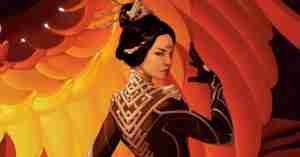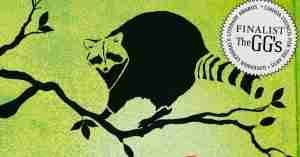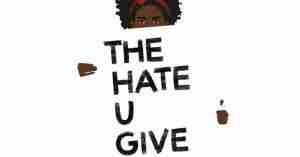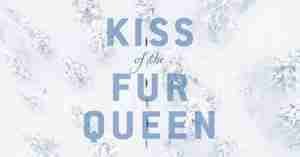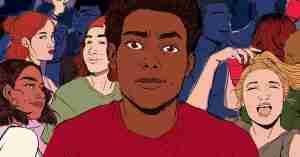The road is black and unsure as the future. Out beyond the headlights looms dark quantum plasma; a world ruled by flux and uncertainty. Trees, road signs, and other cars burst into being, then as suddenly, pop from existence. Hills become open space, and open space, solid walls. Adam shakes his head and watches the LED on the dash clock change from 9:30 to 9:31. He smiles. Lately his life seemed malleable as the memories of eyewitnesses. Hell. The story’s always been the thing. Just exactly who did or said what, where, when, and how, was subject to whim; fickle as subatomic fluctuation.
The guardrail curves space to the left, then twists it right again. Snow begins to fall, feathering even the small triangles of light to indistinct blurs. Some kind of cat moves from one box of blackness to another. A deer materializes in mid-hop, then vanishes before touching ground.
Suddenly lights; a photon riot. A great ship emerges from the fog, its twinkling whirls of tiny particles in the plasma, resolve themselves into windows, beer lights, parked cars. A tavern.
Either time has folded in on itself, or there was some kind of classic car show in town. Gleaming off the tired bar’s Christmas lights, winking through the murk were an assemblage of fins and tails, bullet taillights, and smiling grills, a-sparkle with Christmas cheer. But the glitter bled into the fog.
As Adam edged into the parking lot, he noted the cars were not the just-minted, nine coats of candy apple paint, usual car-show suspects, but muddied, dinted, workaday old-time vehicles. Did he somehow drive to Cuba?
Inside, the warm blush of the Wurlitzer, gleaming wood, bar lights, bottles that glowed from within, warmed the heart, tugging with a strange familiarity.
Adam ordered a beer and settled onto a bar stool. It was served in one of those inverted triangular Pilsner glasses. He watched the bubbles race to join the perfect head crowning the glass. Something about the red vinyl seat seemed familiar. It was one of those old ones that was just a round cushion with no backrest. He could twirl around, just like at his parents’ bar in the basement. He took it for a ride, and smiled up at the bartender who eyed him as he wiped the wood dry. Something about this whole place was familiar. Behind the bar, a large light depicted a Clydesdale standing proud in a bucolic green field. Didn’t his parents have that?
The bar was full of familiar knick-knacks, bric-a-brac, and curios. Christmas lights – the big ones from before they made the small twinkly kind, and paper cut-out decorations, and Christmas cards, hundreds of them, strung across the mirror. A real tree stood in the corner decked out in full jolly, with presents in red and green paper, and an old Lionel train orbiting endlessly around its base. Silly jokes on wooden plaques: “A woman is only as old as she looks. A man is not old until he stops looking.” Steins and mugs of all types and materials adorned the top of the bar, along with those German wolf man-looking guys. Jesus, this place looked just like the bar in his basement as a kid.
Adam eyed the clientele; generic men in Clark Kent hats and wide lapels smelling of gin and tobacco. The women all wore hats, some with veils attached like mosquito netting. Their legs were long and their stockings had black lines down the back. They wore bright red lipstick. Everyone was smoking. Adam felt suddenly they all shared some level of sophistication that he somehow lacked; like adults at a party when he was a child. He closed his eyes and let the sound behave like a giant wave engulfing him, washing over his head before smashing into the beach and exploding into tiny particles of tinkling glass.
A short, bald, Nikita Khrushchev-looking guy walked in with two Teutonic blondes half his age and twice his height; just like Uncle Mickey. And over there Uncle Arthur solemnly recited The Face on the Barroom Floor. This was really getting weird. He took a long sip of beer. It tasted the way he remembered beer tasting when his father let him take sips out of that long Knickerbocker Pilsner Glass he’d accidently broken last year.
“Hey.” Adam raised his hand like a child in a classroom. “Is this some kind of local microbrew?”
The bartender stared at him without saying a word. Adam felt as though he’d just spoken Venusian.
He ordered another, stared into the primordial foam, and tried to think. In the dim and twinkling Christmas lights his watch face was a black hole, numbers swirling over the event horizon. It had nothing to tell him.
Adam stared at the wood before him. Not your normal heavy mahogany, but highly lacquered plywood. He thought of his childhood; the Christmas parties at that plywood bar in their basement, the relatives holding forth, shouting, drinking, singing songs from their day. The juke box burst into being, jarring him from his reverie. Patsy Cline accused him of being Crazy.
Above, waves and particles of light and sound, Adam thought he heard the distant, but distinct sound of his father’s voice calling his name. He strained to hear it again, but heard only the rise and fall of mingled voices in a bar. He recalled the same thing long, long ago at Boy Scout camp. He was far from home, in a canoe far from shore, when he heard his father’s call. Spooky action at a distance. Hadn’t Oliver Sacks written about that very particular auditory hallucination being very common? There was even a name for it; wasn’t there?
In the corner a tow-headed boy argued with his parents. Towhead … What made him think of that? They used to call him towhead when he was very young. What does that even mean; is it towhead or toehead? Adam pictured an absurd Zap Comics-like cartoon of a kid with a giant toe for a head. Apparently, the boy was told the bar was going to be torn down, and he wanted out. They tried to convince him it wouldn’t be torn down with people in it. But he was having none of it. That happened years ago in his uncle Shamrock’s bar; down on that street that isn’t there anymore. Yeah but the parents looked so young. Adam stared, eyes tidally locked on the young versions of his parents; and by default, himself. The argument continued. His father chimed in, smiling photons of starlight twinkled his eyes. The boy grew silent; his thoughts appeared as deep as space. His father looked up to Adam’s gaze, nodding with the same starlit sparkle he shone on the boy. His mother also grinned up at him; the sun smiling on earth.
Eventually, the family exited the bar to the great relief of the boy whose thoughts had landed safely. Adam trailed behind like the silent trace of a meteor. In the parking lot, he watched them board the great green 54 Chevy of his childhood a friend had called, the Norman Green Bomb. In the backseat, big enough to walk in, the boy grasped the cord that draped parabolic from the huge front seat, and started to bounce; humming as he did.
Adam rubs his eyes as the road warps space before him to a nebulous glow. A deer touches down while the arrow of time points from 9:31 to 9:32.
—————————-
Read Ferguson’s second collection of short stories, Shillelagh Law. Ashley Nestler says of Ferguson, “It is clear to me that he is an artist, and I consider him an author who is essential to our current literary world.”


